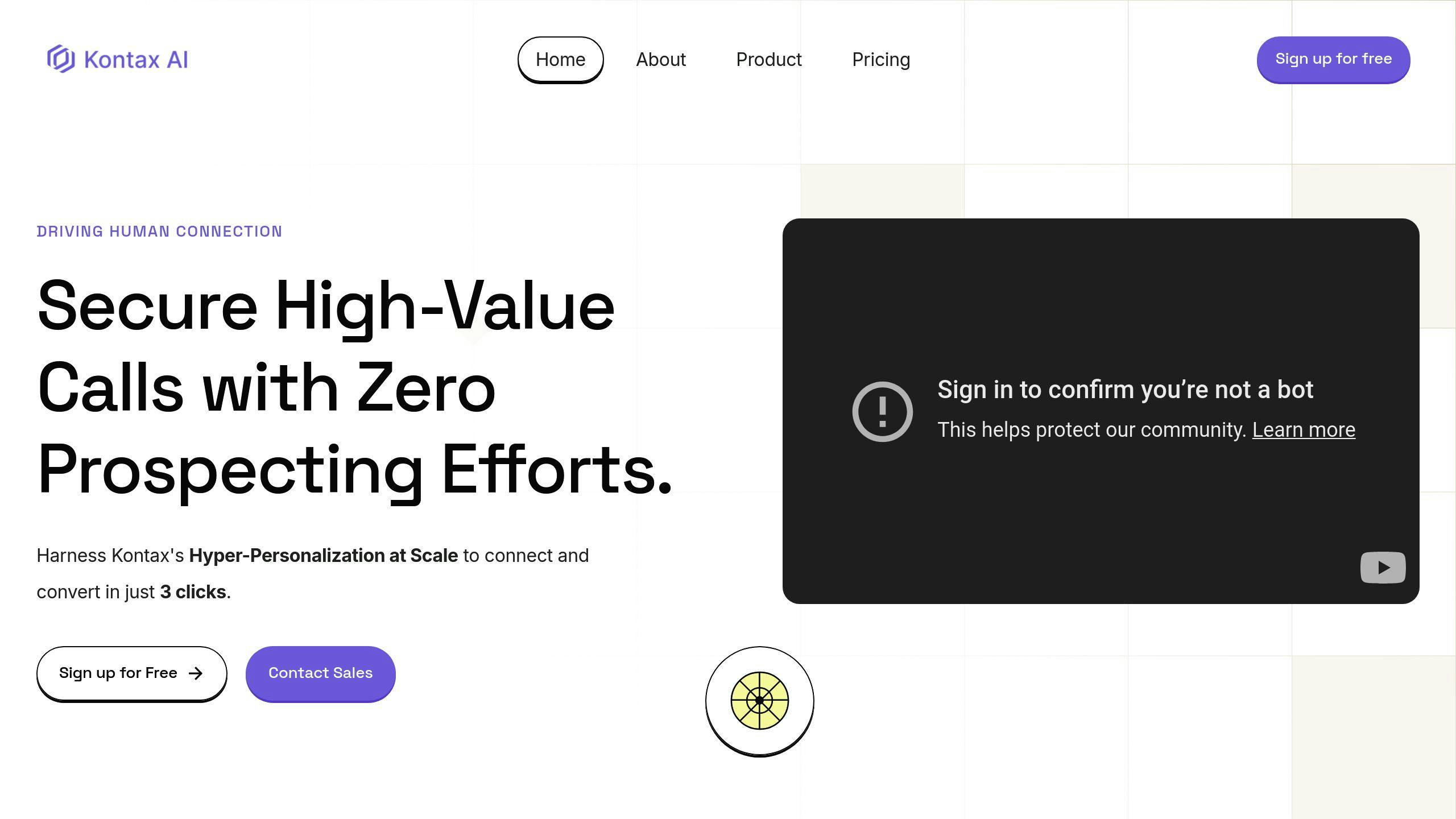Back to Page
Implement ethical AI in sales automation to build trust, protect customer data, and ensure fairness with transparent practices.
AI Prospecting
Sales Prospecting
14 de janeiro de 2025

Omer Hochman
Sales Outreach
Checklist for Ethical AI in Sales Automation
AI in sales automation can boost efficiency, but ethical practices are essential for trust and long-term success. Here's a quick guide to implementing ethical AI:
Protect Customer Data: Use encryption, multi-factor authentication, and clear data usage policies to secure information and comply with regulations like GDPR.
Ensure AI Fairness: Reduce bias in algorithms with diverse data, regular testing, and fairness metrics to serve all customer groups equitably.
Maintain Human Oversight: Allow manual review of AI decisions, ensure transparency, and inform customers about AI's role in interactions.
Respect Privacy: Get explicit consent for data use, limit access, and provide opt-out options to give customers control over their data.
Continuous Improvement: Conduct regular audits, monitor performance, and adapt to evolving AI ethics standards.
Ethics in Ai: Best Practices for Responsible Innovation
1. Protecting Customer Data
Safeguarding customer data isn't just about meeting technical standards - it's a fundamental part of building trust and maintaining ethical AI practices. With the average cost of a data breach reaching $4.35 million [3], prioritizing data security is crucial for any business looking to thrive.
1.1 Securing Data
Effective data protection depends on multiple layers of security, such as:
Encryption protocols: Use encryption methods that meet industry standards to protect customer data.
Multi-factor authentication (MFA): Require MFA for accessing systems to add an extra layer of security.
Frequent security testing: Conduct penetration tests and vulnerability assessments at least every quarter.
Additionally, restrict access to data by adhering to the "least privilege" principle - granting access only when it's absolutely necessary for specific roles.
1.2 Clear Data Usage Policies
Being transparent about how you handle data not only fosters trust but also ensures compliance with regulations like GDPR and CCPA [3]. A well-structured data policy should include:
When drafting these policies, ensure they're easy to read and comprehend. Once data is secure, the next step is ensuring fairness in AI systems.
2. Ensuring AI Fairness
Building fair AI systems for sales automation demands a structured approach to reduce bias and maintain responsibility. With AI error rates reaching up to 35% for certain demographic groups when left unchecked [4], fairness isn’t just about ethics - it’s essential for business success.
2.1 Reducing Bias in Algorithms
Eliminating bias in AI systems helps build trust with customers, which is critical for effective sales automation. Key areas to focus on include:
Leverage tools designed to detect bias and test your systems frequently to ensure they serve all customer groups equitably.
2.2 Establishing Clear Accountability
Accountability in AI-driven sales tools requires well-defined roles and procedures. Here’s how to achieve it:
Keep detailed records of AI decision-making processes, assign oversight responsibilities, and create clear protocols for addressing bias.
Provide training on AI ethics to all relevant staff to reinforce accountability.
Regularly audit both the technical aspects of AI and its real-world impact.
Fairness in AI isn’t a one-and-done task - it demands ongoing attention and refinement [1]. By maintaining transparency and human oversight, you can ensure your AI systems remain ethical and focused on customer needs.
3. Keeping Human Control and Transparency
While ethical principles like fairness lay the groundwork for AI systems, keeping human oversight and ensuring transparency are key to maintaining accountability and trust in practical applications.
3.1 Human Oversight in Decisions
For AI systems to stay accountable and ethically aligned, a well-structured approach to human oversight is essential. Here's how organizations can achieve this:
3.2 Informing Customers of AI Use
Being upfront about AI usage helps build trust and ensures ethical customer engagement. Companies need to clearly communicate when and how AI is involved in interactions.
Key steps to enhance transparency include:
Clear Disclosure: Inform customers at the start of interactions about AI involvement and how it may influence outcomes.
Human Access: Provide an easy option for customers to connect with a human agent whenever needed.
Outcome Clarity: Clearly explain how AI decisions affect customer outcomes in a straightforward manner.
Kontax AI sets a strong example by combining AI-driven lead qualification with human oversight, ensuring a balance between efficiency and trust [2].
Regular audits and transparency practices are essential to maintaining customer confidence. PSHQ's Responsible AI Checklist recommends monthly reviews to evaluate AI systems' transparency and human oversight mechanisms [3].
4. Respecting Customer Privacy
Respecting privacy isn't just about meeting legal requirements - it's about earning and keeping customer trust. When people feel secure interacting with AI systems, they're more likely to engage. As businesses handle growing amounts of customer data, strong privacy practices are essential for compliance and trust-building.
4.1 Getting Explicit Consent
Clear communication is key when collecting and using customer data. By providing straightforward notices, detailed disclosures, and simple opt-out options, companies can meet legal standards and foster trust.
Businesses should also offer transparent documentation on how they handle data and update these policies regularly to reflect any changes in AI data usage [4].
4.2 Preventing Data Sharing
To protect customer data, companies need strong safeguards against unauthorized access. This includes measures like:
Role-based access controls: Limit data access to only those who need it.
Encryption: Protect data during storage and transfer.
Access logs: Keep detailed records for auditing purposes.
Secure storage and deletion protocols: Ensure data is safely stored and erased when no longer needed.
Regular security reviews: Conduct monthly checks to identify and fix vulnerabilities.
Staff training: Educate employees on best practices for data protection.
Balancing personalization with privacy is a must. By focusing on privacy, fairness, and transparency, businesses can create trust and ensure ethical AI-driven sales automation [1].
5. Ongoing Evaluation and Improvement
Maintaining ethical AI practices in sales automation means consistently monitoring and improving your systems. As AI tools interact with more customers and evolve, regular evaluations are key to ensuring they remain both trustworthy and effective.
5.1 Conducting Regular Audits
Regular audits are essential for balancing efficiency and maintaining a human touch in sales automation. These evaluations should cover several critical areas:
Audits shouldn't just collect data - they should lead to actionable improvements. Use the findings to fine-tune your AI systems and address any ethical concerns that arise. This proactive approach helps ensure your tools remain reliable and aligned with ethical standards.
5.2 Keeping Up with AI Ethics
AI ethics is a fast-changing field, and staying informed is critical for businesses using these technologies. To keep pace:
Implement new tools for detecting bias
Strengthen security measures
Improve transparency in AI operations
Provide regular training for your teams
Participate in industry discussions
Seek advice from AI ethics specialists
Proper documentation is equally important. Update ethical guidelines regularly, record all system changes, and ensure compliance with the latest regulations.
"Regular audits, expert input, and industry engagement ensure compliance with evolving ethical standards" [1].
Conclusion: Building Trust with Ethical AI
Using AI ethically in sales automation plays a crucial role in building trust, fostering customer loyalty, and driving long-term growth. It’s not just about meeting regulations - it’s about creating meaningful customer experiences and delivering real business value.
Research shows that companies embracing data protection and transparency see direct benefits, with 85% of customers becoming more loyal to businesses with strong ethical practices [1]. Kontax AI serves as a great example by openly communicating its AI usage, enforcing strict data protection measures, and keeping human oversight as a priority in its sales automation tools. This approach highlights how ethical principles can seamlessly integrate into AI solutions.
How Ethical AI Adds Business Value
Ethical AI isn’t a limitation - it’s an opportunity to build stronger business relationships. By safeguarding customer data, ensuring fairness in algorithms, keeping human involvement where it matters, and conducting regular audits, businesses lay the groundwork for steady growth.
"Regular audits, expert input, and industry engagement ensure compliance with evolving ethical standards" [1].
As AI continues to advance, staying committed to ethical practices will only grow in importance. By embedding these standards into every aspect of AI use, businesses not only meet today’s challenges but also position themselves for success in the future. Ethical AI isn’t just the right choice - it’s a smart investment for building lasting customer trust and achieving sustainable growth.
Example: Ethical AI Implementation with Kontax AI

Kontax AI offers a clear example of ethical AI in action, particularly in sales automation. By embedding ethical practices into its AI-driven tools, Kontax AI achieves measurable business outcomes while staying aligned with core principles.
Kontax AI excels in creating hyper-personalized outreach while safeguarding user privacy. For instance, their system automates LinkedIn message sequences and connection requests, ensuring users are aware of AI's role in these interactions. Strict encryption practices ensure that personalization never comes at the expense of data security.
A key feature is the ability for human agents to override automated decisions in real-time. This ensures ethical consistency, particularly during lead qualification processes. The result? A 300% boost in lead response rates without compromising ethical standards.
Kontax AI also enhances efficiency through algorithms designed to minimize bias and uphold fairness. Combined with clear data policies, the system respects both privacy and integrity. Their approach aligns seamlessly with ethical AI principles, from securing sensitive information to maintaining transparency in every process.
Kontax AI sets an example of how businesses can achieve success while adhering to ethical AI practices, raising the bar for responsible sales automation.
What is the cost Kontax AI?
You can use Kontax AI for as low as $11/month for an automated LinkedIn outreach tool, similar to Lemlist but more than 70% cheaper.
Related Blog Posts
Stay up to date with the latest video business news, strategies, and insights
sent straight to your inbox!


